Today The Circle School releases a study of its graduates, casting the school in a very favorable light. Our graduates go to college at high rates: 84% of those who were here for 4 years of high school, and 91% of our “lifers.” Nationwide the rate among same-age peers is 60%. Our graduates also earn more Bachelor’s, Master’s, and Doctoral degrees than their peers. And 21% are currently pursuing degrees that aren’t even counted in this study.
In the world of education this is great success,
so why do I have such mixed feelings? More about that in a moment.
Clearly The Circle School has excelled in these customary measures of success. How does this happen, in a school with no compulsory curriculum, classes, tests, grades, or homework? How does this happen with students from across the socioeconomic spectrum?
Here’s how I understand it. When adults are not forceful or frantic about pressing academic studies on children, when school instead
immerses kids in self-direction, community, and democracy, at least two relevant patterns tend to emerge. First, children and teens develop their agency and self-responsibility, leaning into life like welcome adventure, a birthright not to be passively deferred until someone pushes them into it. Second, the social value and natural appeal of traditional academic pursuits tend to emerge and flourish, untainted by the bad taste of coercion. Building a satisfying life becomes everyday practice, and college is often on the path.
So why are my feelings about this “success” so mixed? I love that some Circle School graduates — many, actually — are scholars pursuing their dreams through college studies. And I’m pleased for The Circle School to deepen its acceptance and credibility in the world of traditional education.
But in bragging about this aspect of The Circle School’s excellence, I don’t want to endorse the narrow, inadequate, unhelpful obsession of public policymakers with curriculum, academic studies, testing, and grades. Academics and college are important facets of life, but they are not what The Circle School most values. As the study says, The Circle School’s primary aims are about children’s personal fulfillment and engagement in society. “We would rather be judged by our graduates’ self-actualization, life satisfaction, achievement in self-chosen domains, and productive engagement in culture, community, society, and technology.”
I want every child to have ample opportunity for the happiness of a satisfying life filled with meaning and purpose. I don’t want children to postpone pursuit of that sort of deep happiness until tomorrow and tomorrow and tomorrow. I’m pleased now to show that kids can live their lives as kids, today, every day, practicing life at school, and still grow up to go to college.
-Jim Rietmulder
NOTE: You can download the full report (15 pages) here: Circle School Graduates in 2015: College Attendance, Academic Degrees, and Occupations.
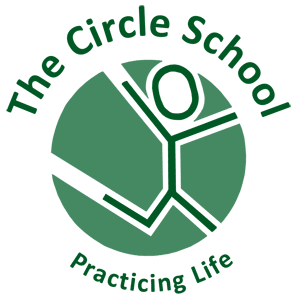
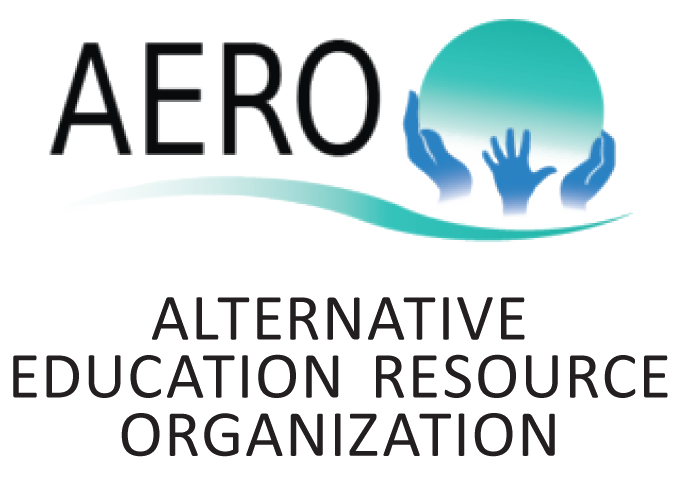
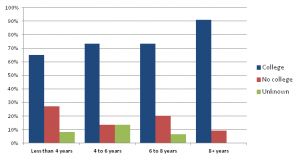
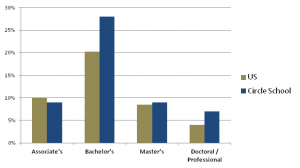
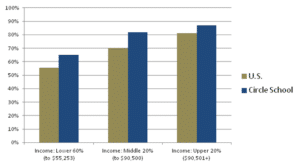
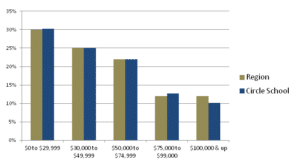
I understand your embarrassment about appearing to brag Jim, but I have to tell you that this kind of information is of enormous value to those of us in Europe trying to create more democratic schools both within and outside our public school systems. So – a big Thank You from me!!
Signing under Derry’s message! Thanks
I have to agree with the above comment. Marks, grades and college may not be anything near what democratic schooling is about, but they do make up the language of the dominant educational paradigm. If people, parents, policy makers, teachers and administrators don’t see these results democratic schooling and all the benifits it has for kids will just be dismissed out of hand. But when they see results like this dismissal is not so easy, it has to be taken seriously and treated as a real and viable option in education.
All it will take is one state, one country to step out off the comfort zone of business as usual and embrace democratic education. If they are to make that big bold step they will need data and evidence like this to give the firm footing to do so.
We need this information desperately, please see its publication in this light and not a betrayal of your educational philosophy. Trust that we understand.
I think studies like this are important, too, as validation and ongoing reassurance for parents whose children are enrolled in democratic schools. And it’s encouragement to make the leap, for parents and teens who see that the dominant paradigm isn’t working, and are looking for a working alternative.
I do not understand your graphs. I believe the first one shows that many circle school students attend some college, but the graph is vague. I also am unclear as to what parameters you are comparing to. The circle school’s student base is much lower and I believe you are comparing to national averages, which I don’t think is a fair comparison. You can argue that the circle school than certain schools if your goal is sending an individual to college but I believe that argument is more about the subculture that those students live in than whether or not the circle school is a good school. Additionally, I believe the circle school to have far less data available than most public schools, so I find your comparisons a tad unreliable.
What I’m more interested in is a direct comparison between several schools than the national average, as the national average includes areas where higher education does not happen, or areas where it happens at an absurdly high rate due to affluence. Show some year by year comparisons for classes, like how many students attended and graduated college from the graduating class of 2009 and so on. Additionally compare your averages to the averages of other schools in the area — Central Dauphin, Holy Name of Jesus and so on. As is this study doesn’t really say much.
Additionally household income. A comparison to average (in the area and national) to that of the student’s would be interesting.
Hi, Tweedum. I think the important finding of the study is that students who are immersed in self-directed community, instead of a forced curriculum and lots of testing, go on to thrive in college and beyond. This finding doesn’t depend on comparisons. It would be fun and interesting to do some of the additional studies you suggest. Alas, most schools don’t publish the necessary data (including the two you name). The study does include the income comparison you suggest, showing two points: (1) The Circle School community’s income profile matches that of the surrounding region; and (2) Students from across the income spectrum attend college at rates higher than average for their family’s income class. By the way, you might find the graphs easier to understand in the full study, which you can download at the bottom of the school’s blog post, here: https://www.circleschool.org/2015/08/circle-school-graduates-in-college-2/. Thanks for giving this some thought. -Jim R
Very informative and well written article. Thanks Jim!